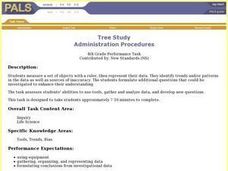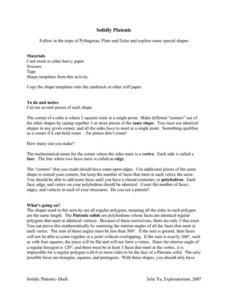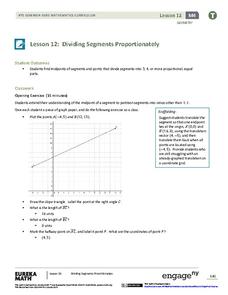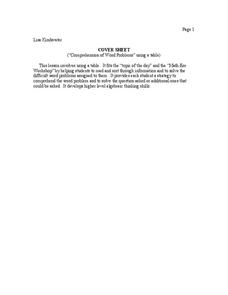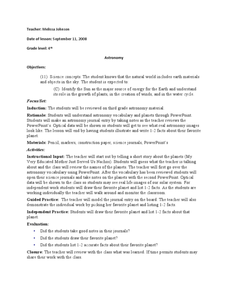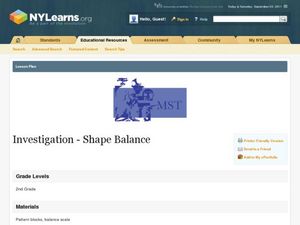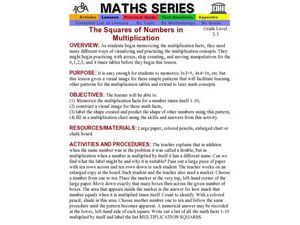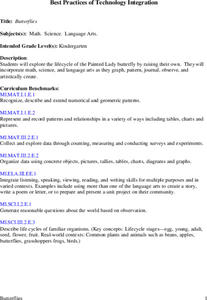Curated OER
The Monarch Butterfly Watch
Learners explore monarch migration through the Journey North web site. In this butterfly instructional activity, students use the internet to identify a butterfly's migration pattern. Learners write in electronic journals.
Curated OER
Food Pyramid Power: Looking Back and Moving Forward
Students show their knowledge of properties of objects as it pertains to sorting and creating patterns. In this food pyramid power lesson plan, students show their ability to use whole numbers in different representations by appling...
Curated OER
"A Pig is Big"
Students explore the concept of big, bigger, and biggest. They examine and classify items by size, listen to and discuss the book "A Pig is Big," complete a fill in the blank activity, and create a tri-fold that illustrates two items...
Curated OER
Tree Study
Students measure the lengths of provided leafs to the nearest millimeter. Students identify trends in the data as well as sourced of inaccuracy and formulate additional questions that could be investigated to enhance their understanding.
Curated OER
Sweet or Sour, Like or Different
Students watch a video on comparisons and discuss ways in which objects can be sorted. They play an identification game with a lemon and discuss identification characteristics.
Curated OER
Solidly Platonic
When they do, they learn. Using this resource, young mathematicians learn about platonic solids by actually building, touching, and examining the shapes. They connect their observations about the shapes to Euler's formula.
EngageNY
Dividing Segments Proportionately
Fractions, ratios, and proportions: what do they have to do with segments? Scholars discover the midpoint formula through coordinate geometry. Next, they expand on the formula to apply it to dividing the segment into different ratios and...
Curated OER
Activity: Gummy Bear Genetics
Who's your Daddy ... and Mommy for that matter? Given a first-generation group of gummy bear offspring, young scientists must determine which bears are their parents. An activity worksheet covers the differences in genotypes and...
Maryland Department of Education
The Concept of Diversity in World Literature Lesson 7: Cultural Commentary
As part of their study of Things Fall Apart, class groups develop a multimedia presentation in response to the question, "In what ways does Achebe use literature as a means to express and comment on culture and history?"
PHET
The Earth as a Magnet
Everyone loves playing with magnets and iron filings. Here, young scientists first observe and then participate in an activity demonstrating magnetic fields. After completing their observations, they apply this knowledge to...
Code.org
Controlling Memory with Variables
Not all variables are created equal. Discover how variables in computer science are different from variables in math class. Scholars learn to work with variables in computer programming by developing a mental model for how variables...
Curated OER
"Comprehension of Word Problems" Using a Table
Sixth graders practice solving math problems by utilizing a data table. In this number sense lesson, 6th graders create a table using the numerical information about a fictitious farm's inventory. Students complete the empty segments by...
Curated OER
An Introduction to Functions
Learners investigate the growth and decay of an exponential function. In this algebra instructional activity, students apply properties of exponent solve problems. They identify any patterns they see in the graphs.
Curated OER
Astronomy
Learners complete a series of activities to better understand space studies. In this space science activity, the teacher is provided with a number of activities for students to complete such as finding words that begin with the prefix...
Curated OER
Investigation-Mathematical Reasoning: Tables and Chairs
Fourth graders design a table and chair arrangement. In this mathematical reasoning lesson, 4th graders place tables shaped like equilateral triangles so that they seat the appropriate number of guests.
Curated OER
Snakes: Illusions in Locomotion
Students learn how snakes move. For this locomotion lesson, students learn the four main methods of locomotion that snakes use. Students visually create one locomotive movement.
Curated OER
Investigation: Shape Balance
Second graders explore geometry by utilizing pattern blocks. In this shape identification lesson, 2nd graders view the characteristics for several different geometric shapes and create them using building blocks and other classroom...
Curated OER
No Title
Third graders assess how to read and write rhythmic notation in music. They explore the concepts of whole, half, quarter, eighth, dotted lines, extended pentatonic, diatonic and major/minor modes. Symbols along with additional...
Curated OER
Telling Time to 5 Minutes
Learners take part in various activities ranging from creating a human clock, to small group problem solving to reinforce the concept of telling time accurately to five minutes on an analog clock.
Curated OER
The Squares of Numbers in Multiplication
Learners make multiplication squares. For this math lesson, students review their multiplication facts and multiplication strategies. Learners are introduced to multiplication squares when multiplying a number by itself.
Curated OER
Create Koi Nobori: Carp Kites
Students study the Japanese art of Koi Nabori or carp kites. They create their own carp kites with repeating patterns.
Curated OER
Butterflies
Students will explore the life cycle of the Painted Lady butterfly by raising their own. They will incorporate math, science, and language arts as they graph, pattern, journal, observe, and artistically create.
Curated OER
Investigation - I've Got It
Students explore patterns by participating in a sorting activity. In this pattern identification lesson, students collaborate in a group and share their footwear in order to categorize each other's shoes based on similar characteristics....





